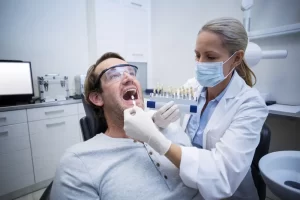
Young smiling assistant in blue uniform making notes in registration document while looking at one of patients of dental clinics
The evolution of mobile health services, including innovative solutions like “A Plus Home Foot Care,” presents a significant advancement in how healthcare is delivered. These services not only provide convenience but also pose unique challenges, particularly in the areas of privacy and security. As these mobile labs visit patients at home to provide care, particularly for podiatric services, ensuring patient confidentiality becomes paramount.
The Importance of Data Protection in Mobile Health Services
Mobile health lab services collect a wide array of sensitive information, ranging from personal identification details to comprehensive medical histories. Protecting this data is crucial, not only to comply with regulations such as HIPAA in the United States but also to maintain patient trust. For mobile services like A Plus Home Foot Care, implementing robust encryption methods for data storage and transmission is essential. This ensures that even if data is intercepted, it remains unreadable to unauthorized parties.
Secure Communication Channels
To further safeguard privacy, mobile health services must establish secure communication channels for all interactions involving patient data. This includes consultations, scheduling, and follow-ups conducted remotely. Employing end-to-end encryption in these communication tools ensures that conversations about patient care, especially sensitive treatments related to foot health, remain confidential and secure from cyber threats.
Training and Compliance
Another critical aspect is the continuous training of staff in privacy policies and security protocols. Mobile health services like A Plus Home Foot Care require a team that is not only skilled in healthcare but also in handling data securely. Regular training sessions should be mandatory, emphasizing the importance of confidentiality and the proper steps to handle and dispose of patient information securely.
Regular Audits and Updates
To maintain high standards of security, regular audits of security measures and protocols are necessary. These audits help identify any vulnerabilities and ensure compliance with current regulations. Moreover, keeping software and hardware updated, especially those used for recording and storing patient data, is crucial in protecting against new security threats.
Conclusion
Mobile health lab services, exemplified by A Plus Home Foot Care, bring specialized healthcare right to the patient’s doorstep. However, the convenience of mobile healthcare comes with the responsibility to ensure that all patient information remains secure and private. By focusing on robust encryption, secure communication, staff training, and regular audits, these services can protect their patients’ confidentiality and build a trustworthy relationship. Ensuring privacy and security in mobile health not only complies with legal requirements but also reinforces patient confidence in these increasingly popular healthcare services.






